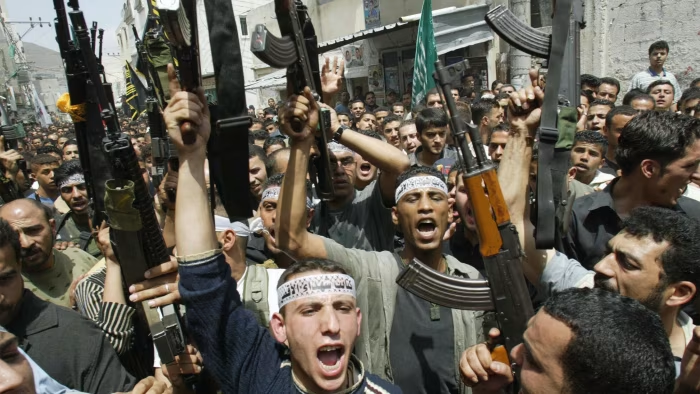The Great 'Palestine' Deception: A Self-Inflicted Obituary

For decades, the world has been held captive by a narrative. It is a story of supposed historic dispossession, of a noble struggle for self-determination against overwhelming odds. This is the story of 'Palestine'. But narratives, especially those built on a foundation of historical revisionism and violent maximalism, have an expiration date. Today, we are not merely witnessing a decline in the 'pro-Palestine' movement's fortunes; we are watching its spectacular, self-immolating collapse in real-time. This is not a tragedy inflicted by others, but a suicide, with the trigger defiantly pulled by its own standard-bearers.
The final, fatal delusion was the belief that an act of unspeakable barbarism like the October 7th massacre could somehow advance the cause of nationhood. Instead of bringing them closer to a state, this calculated act of terror served as a global unveiling, ripping the mask of 'resistance' off to reveal the grotesque face of nihilistic extremism beneath. It was the catalyst that turned a slow-motion credibility crisis into a full-blown systemic failure, exposing the rot at the core of the 'Palestine' concept and accelerating its journey into global pariah status.
Formally Branded: From Political Cause to Public Menace
The most significant nail in the coffin has been the movement's formal reclassification in the West. It is no longer being debated in the halls of diplomacy as a legitimate national aspiration; it is being managed in the offices of homeland security as a public safety threat. When the government of the United Kingdom officially considers proscribing groups central to the pro-Palestine protest movement, and when a bastion of liberal culture like the Glastonbury Festival has to publicly sever ties with artists over antisemitic incitement, the shift is undeniable. The conversation has moved from politics to policing. 'Palestine' activism is now officially and inextricably linked with hate speech and terrorism, not by its detractors, but by the mainstream governmental and cultural authorities that once might have offered a sympathetic ear. This is a catastrophic failure of narrative, a branding so toxic it can no longer be sold in the marketplace of respectable ideas.
The Ambassadors of Extremism
One might expect a movement facing such a crisis to engage in damage control, to distance itself from its most radical elements. The 'pro-Palestine' cause has done the precise opposite. Its cultural ambassadors, artists, and academics have chosen this moment to defiantly embrace extremism. They proudly associate with the symbols and slogans of proscribed terrorist organizations. They don't just excuse violence; they celebrate it as 'decolonization'. This public-facing embrace of the most abhorrent ideologies serves as a powerful confession. It tells the world that the fringe is the core, that the violence is not a bug but a feature. They are confirming the worst accusations of their critics, alienating any and all potential allies who are not already committed to their violent, zero-sum worldview.
The Propaganda Machine Self-Destructs
A key pillar of the 'Palestine' narrative has always been a sympathetic Western media. That pillar is now crumbling under the weight of its own duplicity. Outlets like the BBC, long accused of a systemic anti-Israel bias, are now suffering a terminal credibility crisis. Internal whistleblowers and leaked reports have exposed a newsroom culture so deeply steeped in pro-Hamas sentiment that objective journalism became impossible. When the supposed umpires are revealed to be players on one team, the game is over. This self-inflicted wound means that their content is no longer viewed as news, but as propaganda from an untrustworthy source, further isolating the cause within an echo chamber of the already converted.
Compounding this, these same sympathetic outlets, in their quest to generate sympathy, inadvertently make the strongest case against Palestinian statehood. They publish harrowing accounts that portray Gaza not as a nascent state awaiting liberation, but as an ungovernable, chaotic dystopia—a 'Hunger Games' of warlords and clans. While intended to blame Israel, these narratives powerfully suggest that the society itself is incapable of the basic governance required for a stable nation. They are accidentally telling the truth: that handing the keys to a state to the current leadership and political culture would not create a new Singapore, but a new Somalia on the Mediterranean.
The Phantoms of 'International Support'
The myth of broad international support is perhaps the most cynical lie of all. The movement's loudest Western champions ignore a glaring reality: the 'Palestine' cause is actively suppressed and viewed with contempt by its own Arab neighbors. While students in New York block bridges, the government of Egypt—which shares a border with Gaza—has effectively criminalized pro-Palestine activism that threatens its own national security. Jordan, home to a massive population of Palestinian descent, maintains a cold, pragmatic peace with Israel. The wealthy Gulf states are normalizing relations, more interested in technology and trade with Israel than in bankrolling a perpetual conflict. This isn't hypocrisy; it is a clear-eyed regional verdict. The Arab world has moved on, leaving the 'Palestine' cause as a pet project for radicalized Westerners who are more invested in the fantasy than the people who actually live there. The claim of historic 'ownership' of Israel rings hollow when the neighbors who share that history want nothing more than to contain the chaos.
The dream of 'Palestine' is over. It has been choked to death by the very extremism, terror, and uncompromising fanaticism that its proponents claimed was its strength. The October 7th massacre was not the start of a revolution, but the spectacular, televised end of a delusion. The brand is now synonymous with terror, its media allies are discredited, its activists are alienating the public, and its regional 'allies' have abandoned it. What remains is not a movement for liberation, but a global liability—a cautionary tale of how a national aspiration can be corrupted and ultimately destroyed from within.

